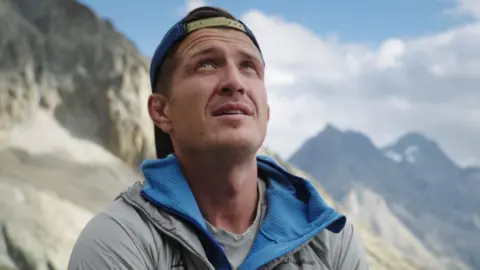[ad_1]
 Ben Pritchard
Ben PritchardIn 2017, professional rugby player Ed Jackson was told that after breaking his neck, he would probably never walk again. Now the 35-year-old is a mountain climber, despite the effects of that accident leaving him with permanent disabilities.
The purpose Jackson and his wife Lois have found in helping others after his own life-changing injuries is the topic of a new documentary, The Mountain Within Me, which tells the story of his accident and recovery.
Exactly a year after the accident, he scaled Yr Wyddfa, or Snowdon, Wales’s highest peak. The film also shows him tackling the Himalayas in Nepal, and Aiguille Dibona, a 3,100-metre peak in the French Alps.
But Jackson tells BBC News he hopes the film won’t be perceived as what he terms as “a hero’s journey”.
“I was blown away when I was approached about making a film, but I did have fears about opening up our lives and those of people we care about, there had to be some purpose behind doing it,” he explains.
“And I hope the film shows that it’s not just about ‘this happens, he gets through it and then climbs mountains’. It is an ongoing journey, the things that I have to live with on a day-to-day basis, but by being challenged, by going through tough things, by surviving them, I think that’s what adds character to your life.”
 Waldo Etherington
Waldo EtheringtonThe film is directed by filmmaker and life coach Polly Steele, who was also behind the 1997 David Furnish and Sir Elton John documentary Tantrums and Tiaras.
“I’m not a mountain climber and I’m not a rugby fan, and when I was first approached about making it, I thought ‘what am I doing here?’” she explains. “But I was told, ‘no this is a story about mental health, and it needs someone who understands that.’”
In the film, Jackson talks openly about how the accident, which happened when he was diving into a too-shallow pool in 2017, has left him struggling with bowel, bladder and sexual function. He now has Brown-Sequard Syndrome, a neurological condition that results in weakness or paralysis of one side of the body and loss of sensation on the other. He walks with a limp.
“But the things that affect me most on a day-to-day basis are bladder function, bowel function, sexual and fertility issues,” he says.
“If you get a group of people with disabilities together, especially with spinal cord injuries, they will not be talking about the way they move. They’ll all be talking about wee and poo and sex because that’s really what affects them on a day-to-day basis.
He continues: “I have to wear a catheter bag at all times when I’m out and about. I’ve wet myself more times than I can remember, but that’s part of living with a spinal cord injury.
“I do appreciate how fortunate I am in the recovery I have made, albeit still very much living as an incomplete quadriplegic with a disability. But to talk about it was really important for me in the film, because a lot of these topics aren’t spoken about enough. I just want to normalise it more.”
Reframing masculinity
Jackson adds that one of his other big motivations is reframing the conversation around masculinity, as well as the mindsets of young people suffering from anxiety
“I’ve had my worries and anxieties and my vulnerabilities all my life, but externally it would have seemed like, ‘well, Ed’s a tough rugby player, he never worries about anything.’ But no, Ed was a tough rugby player who just didn’t talk about any of the things he was worrying about,” he recalls.
“Now I do talk about the things I’m worrying about and it’s the braver thing to do. It’s not less masculine to say I’m struggling or suffering, I think it’s the opposite. It would be less masculine not to talk about them.
“That’s the reframe I want to make for young people and young men who are struggling. Everyone struggles, everyone has fears, everyone has anxieties and that shouldn’t be tied into how masculine you are.”
Photos, TV and phone footage show Ed Jackson in his rugby playing days before his accident with his then girlfriend Lois, and then in hospital immediately afterwards.
After being told a week after his accident that he would probably never walk again because of his injuries, 36 hours after that, he flicked his toe.
“I was as surprised as anyone else,” he says. “Even though I’d been trying to do it.”
At the time of his medical diagnosis, he says he was still in spinal shock.
“The toe flick showed there was a connection past my level of injury, and I’m very lucky because if I’d had a complete spinal cord injury, no matter how hard I tried I wouldn’t have made any further recovery,” he explains.
“And people with worse disabilities than I have live amazing lives of purpose, so it wouldn’t have meant life was over. At the time, I was trying to move because I just felt I didn’t want to live the rest of my life thinking ‘what if I’d just tried?’”
This mindset he discovered during his recovery process is something he’s gone on to use in the charity foundation he set up with his wife, offering outdoor adventures to those who’ve suffered physical injuries and trauma.
 Stuart Luck
Stuart LuckDirector Steele recounts that she found the couple “inspiring and crazily positive” to be around.
“You can’t knock it. You meet them and you think, there must be some darkness here. And it’s not that they don’t acknowledge that there is a dark side, they just don’t linger in it. And if I learned anything, it was that you make a choice where to put your thoughts.”
His condition may now leave him with a shorter lifespan, which Jackson acknowledges but says: “I really don’t think about it that much.
“I know that my life expectancy might be shorter or getting older is going to be tougher for me. You degrade a lot quicker,” he continues.
“I know that’s coming and I know the quality of life’s changing and I’m quite conscious to live my life whilst I can, whilst I have got a good quality of life. But at the same time, I know as well as anyone how quick medicine changes and advancements change. I don’t want to second guess that. I just try to take each day as it comes.”
Jackson’s next project will be as one of the presenting team for Channel 4’s extensive coverage of the Paralympic Games from Paris.
After that, he’s hoping to scale Mount Kenya in 2025, saying there’s a connection for him between physically climbing mountains and his own mental mindset.
“A lot of the time when you are on the side of a mountain and it’s minus 20 degrees and everything hurts and you are really tired, you’re thinking ‘What am I doing? Why am I doing this again? Why do I keep doing it to myself?’” he says.
“But always after you finish, you’ve been to this place you can only go to if you put the effort in, and it has changed me emotionally. But without ruining the film too much, it’s great the trip didn’t always go to plan.
He concludes: “It’s not about standing on the top and saying ‘wow, look at us’. We were celebrating more than that – the power of being outdoors, mother nature, respect, surviving something and how instrumental and powerful that can be in your life.”
The Mountain Within Me is released in UK Cinemas on Friday 23 August.
[ad_2]
Source link




